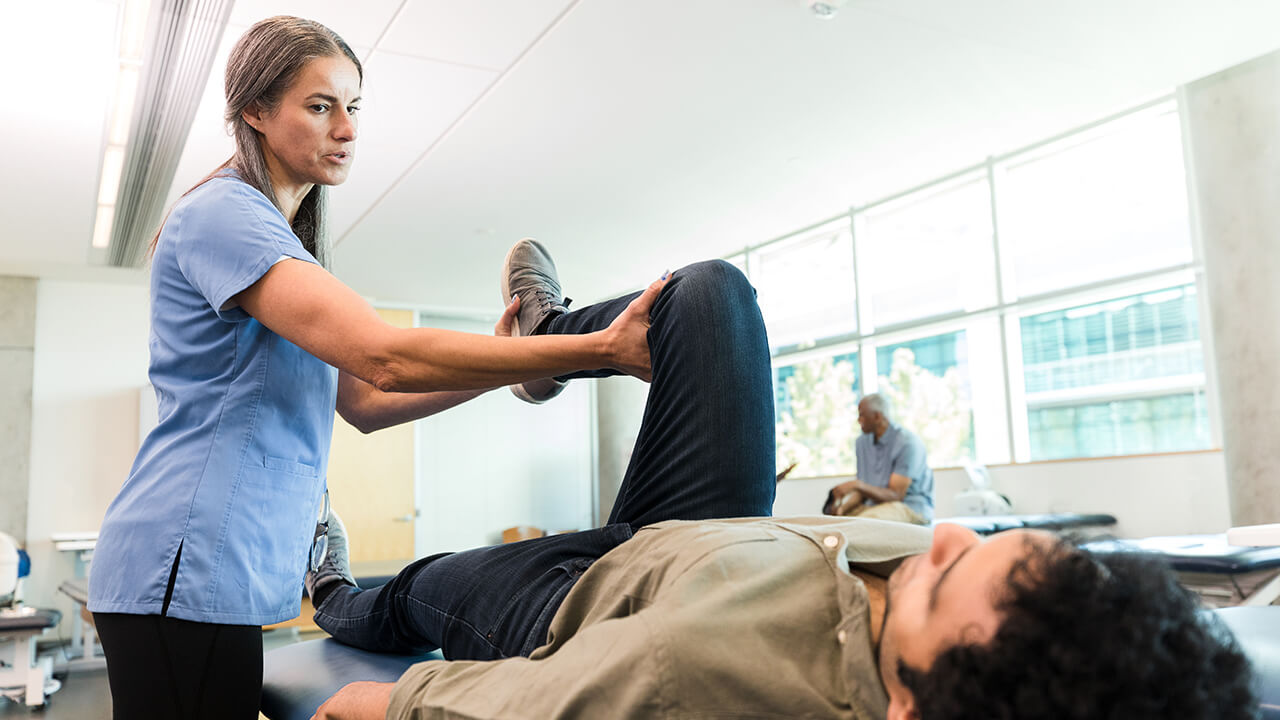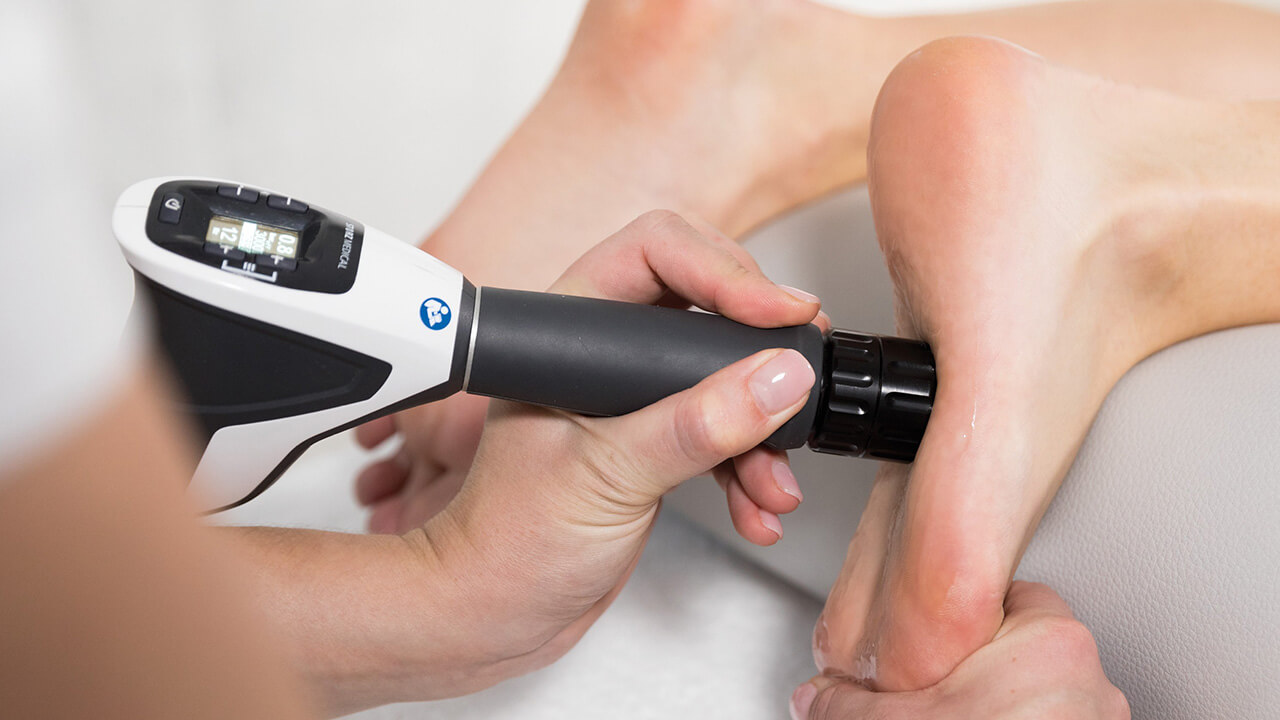This program provides people with Parkinson’s disease hope by improving their quality of life through a non-contact boxing-based fitness curriculum. It’s time to fight back against Parkinson’s disease.
Physical therapy
Prevea's therapists are ready to help you feel better. Get started today.


Choose Prevea physical therapy
Injuries, illnesses and surgery can significantly impact your mobility and cause ongoing pain. Our team of experienced physical therapists is dedicated to helping you regain your strength, flexibility and overall well-being.
What is physical therapy?
Physical therapy (PT) is conservative treatment that uses a variety of techniques, including exercises, manual therapy and modalities, to help you recover from injuries, manage pain and improve your overall quality of life.
Our approach to care
At Prevea Health, we believe in a comprehensive approach to PT. Our team of skilled therapists works closely with your physician to develop a personalized treatment plan tailored to your specific needs. We prioritize:
- Personalized care: We understand each patient is unique. Our therapists take the time to listen to your concerns and develop a treatment plan that addresses your individual needs.
- Advanced techniques: We utilize the latest techniques and technologies to help you achieve optimal results.
- Collaboration: Our therapists work closely with you, your physician and other healthcare providers to ensure a coordinated approach to your care.
- Convenient access: We offer flexible scheduling options to accommodate your busy lifestyle.
Physical therapy services
The goal of BFR therapy is to reduce just enough blood flow to an extremity to create positive changes. The amount of pressure used varies between individuals based on size of limbs, density of the soft tissue, blood pressure and placement and width of the tourniquet cuff.
Benefits of BFR therapy include:
- Minimizes muscle loss after injury
- Promotes muscle growth
- Enhance therapy outcomes
BFR therapy can benefit those recovering from:
- Achilles repairs
- Fractures
- Inflammatory muscle wasting diseases, such as polymyositis and dermatomyositis
- Knee reconstructions and cartilage repairs
- Muscle strains
- Nerve injuries
- Severe musculoskeletal trauma
- Symptomatic knee osteoarthritis
- Tendinopathies
- Total joint replacement
- Weakness after surgery
Find a therapist.
Practicing BIG movements during intense therapy sessions can help individuals resume or continue daily self-care activities. The larger-than-life movements used during LSVT BIG® treatments help people improve:
- Walking speed
- Stride length
- Twisting and turning motion
- Posture
- Flexibility
- Balance
- Strength
- Endurance
- Arm movement
- Leg movement
When treatment starts at diagnosis or when symptoms appear, it has the greatest effect. People often can resume or maintain an active lifestyle. However, the benefits of LSVT BIG® are seen no matter where in the disease progression a person begins therapy. Learning to control and improve their ability to move gives people confidence and allows them to enjoy a better quality of life.
Find a therapist.
For patients dealing with dizziness or poor balance, our specialists will develop a personalized plan to address their specific need. We offer the most advanced treatments available to help patients regain their balance.
Using the latest technology and techniques, you’ll have access to the most advanced treatments available to enhance and improve your quality of life. We will work with you and your primary care provider to decrease your symptoms and help you complete activities with ease.
We treat:
- Balance rehabilitation
- Concussion therapy
- Dizziness
- Fall risk assessment
- Motion sickness
- Vertigo
- Vestibular migraines
Our purpose is to help you improve strength, flexibility, endurance, balance and function.
- Common conditions:
- Muscle weakness
- Incision/radiation tissue restrictions
- Fatigue
- Joint pain
- Lymphedema (swelling due to lymph node removal)
- Nerve damage
- Treatment approaches:
- Exercise programs tailored to individual needs
- Manual therapy techniques (e.g., massage, mobilization)
- Pain management strategies
- Gait training
- Lymphedema management
- Improved function: Regain independence in daily activities
- Enhanced quality of life: Experience less pain, fatigue, and anxiety
- Increased confidence: Feel more empowered to manage challenges
- Better overall well-being: Improve physical, emotional, and social health
Find a therapist.
Edema means swelling caused by fluid in your body’s tissues. It usually occurs in the feet, ankles and legs, but it can involve your entire body. This swelling may be caused by disease (such as congestive heart failure, kidney disease and thyroid disorders), a birth defect, surgery, cancer treatment or other problems.
Lymphedema is swelling caused by a build-up of lymph fluid in the body. The lymph system (lymphatic vessels) filters and drains excess fluid in your body. If the lymph system is damaged, the fluid builds up and causes swelling. Lymphedema is recognized as a complication following cancer treatment; however, it can develop from edema that is not managed. In rare instances, a person is born with a challenged lymphatic system.
Treatment options from Prevea’s expert team of therapists include:
- Compression garments/bandaging to maintain reduction
- Decongestive therapy
- Decrease swelling
- Lymphedema treatment
- Manual lymphatic massage
- Pneumatic pump to enhance swelling reduction
- Skin care and scar management
- Wound management
Many men are known for waiting until something is seriously wrong before going to the doctor. So symptoms like pelvic pain, bathroom trouble or weak muscles and bones may be holding them back from getting the most out of life. There’s no need to tough it out. Help from Prevea’s team of men’s health experts will get you back to your best.
Prevea’s team of physical and occupational therapists specializes in men’s health. We work with your primary physician or specialist to develop an individualized treatment plan, using the latest and most advanced therapy techniques.
Key services and conditions we treat include:
- Bladder and pelvic floor muscle retraining
- Bowel/fecal incontinence
- Urinary incontinence and dysfunction
- Pelvic pain
- Prostatitis treatment
- Pre- and post-prostate surgery treatment
- Real-time ultrasound for pelvic floor muscle retraining
When you’re facing a neurological condition, tackling small, everyday tasks is often one of your top priorities. With a large network of neuro-rehabilitative therapists and multiple convenient locations, Prevea has the expertise to help people overcome neurological deficits and maximize their independence. We will help you achieve your best quality of life.
When injury, illness or disease affects a patient’s nervous system, we stay at the forefront of therapy techniques to help enhance balance and strength, restore movement, and improve speech and cognition. It’s true collaboration across multiple disciplines, including physical, occupational and speech therapy. And, it’s all focused on enhancing the quality of life of our patients, their families and their caregivers.
Prevea’s neurological therapy program provides specialized and comprehensive care for any type of neurological condition, short or long term, that can benefit from therapy.
Treatment options from Prevea’s expert team of therapists include:
- Amyotrophic Lateral Sclerosis (ALS)
- Bioness® H200 and L300 electrical stimulation for improved hand movement and walking
- Brain injury
- Brain tumors
- Guillian Barre
- LSVT BIG®
- Multiple Sclerosis
- Muscular Dystrophy
- Muscular Dystrophy Clinic
- Parkinson’s Clinic
- Specialized weight-supported walking equipment
- Spinal cord injury
- Stroke
- Visual perceptual rehabilitation program
Our dedicated orthopedic therapy team includes licensed physical and occupational therapists. They use state-of-the-art equipment and work hands-on with their patients to help relieve pain and improve overall muscle, bone and joint health.
We work closely with your physician to develop a personalized treatment plan, which may include manual therapy, exercise, strength training and options for pain control, to help you regain independence after an injury or surgery so you can get moving again and back to the things you enjoy most in life.
Key services and treatment for conditions including:
- AlterG® anti-gravity treadmill
- Arthritis pain
- Back pain and injury
- Blood flow restriction therapy
- Custom fit orthotics
- Elbow pain and injury
- Ergonomics
- Foot/ankle pain and injury
- Hand/wrist pain and injury
- Hip pain and injury
- Joint replacement rehab
- Knee pain and injury
- Osteoporosis management
- Shockwave therapy
- Shoulder pain and injury including rotator cuff
- Spine care
- Work-related injuries
The chronic pain treatment at Prevea uses a variety of evidence-guided treatments. The length of the program is determined by the individual’s needs and will be discussed at the first appointment. Most insurance programs will cover this type of physical rehabilitation.
At the first appointment, a thorough examination will be performed. This will consist of evaluation of your muscles, nerves and overall movement patterns. We will discuss your current thoughts on pain and scientific research regarding pain science. Together, based on our findings, we will create a specific plan for you.
Conditions we treat include:
- Arthritis pain
- Back pain (neck, lumbar, tailbone, SI, general)
- Complex Regional Pain Syndrome (CRPS)
- Headaches/migraines
- Myofascial pain
- Phantom limb pain
- Posture pain
Our pediatric specialized team of physical therapists provide care to young patients.Prevea also partners with HSHS St. Vincent Children’s Hospital in Green Bay to offer your child the most advanced, expert care in the area.
Find a therapist.
Don’t let sports injuries, joint pain or other performance challenges keep you from doing what you’re passionate about. We’ll help you understand your injury, adjust and adapt activity so that you can heal while keeping your competitive edge, and help you avoid re-injury with preventive exercises and techniques. From the latest manual therapy techniques to exercise prescription, your fully personalized treatment plan will include everything you need to return to your best. It’s what you’d expect from the team that pioneered sports medicine in northeastern Wisconsin more than 30 years ago.
Services and treatment options include:
- ACL rehab
- AlterG® anti-gravity treadmill
- Athletic injuries
- Athletic training
- Blood flow restriction therapy
- Concussion therapy
- Lower extremity functional test
- Movement analysis for biking, running, throwing and golf swing
- Post-surgery/post-operative
- Proteus, measuring strength and power
- Sport-specific training techniques (agility and speed)
The jaw is a complicated joint that is affected by the position of your spine, and issues related to the jaw, including pain, locking and limited mouth opening, can have a frustrating impact on day-to-day life.
Many times, the key to successful treatment of Temporomandibular Joint Disorders (TMD) is targeting the entire spine. Prevea’s expert physical therapy staff has been trained by nationally recognized physical therapists through continuing education courses to use advanced spine and jaw treatment techniques. They will work with your dental provider and/or physician to provide the best possible care.
Treatment options from Prevea’s expert team of therapists include:
- Bells Palsy
- Jaw pain
- Jaw locking
- Limited opening
- Pain with chewing/eating
- Pain with prolonged talking
- Pain with yawning
- Neck pain or headaches associated with any of the above symptoms
- Trismus
Prevea’s team of physical and occupational therapists are experts in the treatment of incontinence, pelvic pain and prolapse, pregnancy-related pelvic conditions and osteoporosis management. We will work with your primary care physician or specialist to assess your condition and determine a personalized treatment plan.
Bladder control issues are among the most common, and most treatable, medical conditions. Our therapists specialize in several techniques that help relieve the symptoms of incontinence for greater independence and an improved quality of life.
- Biofeedback and electrical stimulation for muscle recruitment and coordination
- Bladder and pelvic floor muscle retraining
- Bowel dysfunction
- Realtime ultrasound for pelvic floor muscle retraining
- Relaxation techniques for pelvic floor muscle tension
- Urinary incontinence and dysfunction
As a woman, your body has special needs and sometimes requires special care. If you’re dealing with the discomfort, inconvenience or embarrassment of urinary or pelvic issues, Prevea’s women’s care therapy experts are here to help. We specialize in the unique challenges of the female body and will help you regain your confidence.
Prevea’s therapy team includes experts in treatment of incontinence, pelvic pain and prolapse, pregnancy/post-partum care and management of osteoporosis. We’re leaders in advanced therapies, such as biofeedback and muscle retraining. And we work with primary care providers and specialists to assess each individual patient’s condition and create a personalized treatment plan.
Treatment options from Prevea’s expert team of women’s health therapists include:
- Bowel dysfunction
- Bladder and pelvic floor muscle retraining
- Exercise guidance during pregnancy
- Pregnancy-related symptoms including preparation for labor and delivery
- Clogged milk duct support for nursing moms
- Fourth trimester care/post-partum care
- Lactation support and counseling
- Realtime ultrasound for pelvic floor muscle coordination
- Pain with intercourse support
Our specialized team is made up of skilled professionals who are trained in visceral manipulation and other advanced therapies. With a deep understanding of the body’s internal systems, they work together to provide personalized care that focuses on restoring movement, balance and overall well-being. Each team member is dedicated to helping you feel your best by using gentle techniques that support your body's natural healing process. Whether you're dealing with pain, digestive issues or other health concerns, our team will guide you every step of the way.
Conditions we treat include:
- Abdominal pain
- Chronic pain
- Digestive issues
- Scar adhesions
- Respiratory issues

Rock steady boxing
No referral needed
Direct access without a referral or prescription to physical or occupational therapy provides you with immediate access to start your treatment without delay.
More resources from Prevea Health

Shockwave Therapy

Parkinson's Clinic


Tenex Health TX
Find a therapist today
You deserve to heal as fully as possible. Trust the Prevea physical, occupational and speech therapy experts to help you get there. Contact us today to start the recovery process.